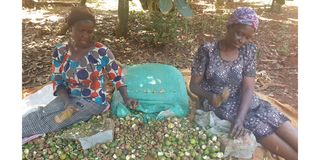Premium
Women in rural Kenya to benefit from EU-funded macadamia project

Grace Wamucira (left) and her friend Susan Wangerwa shelling macadamia nuts in Embu.
It is mid-morning in Mbiri village, Embu County and two women are bee busy cracking macadamia nuts.
Each one of them has an improvised wooden hammer which he uses to strike the nuts to remove the soft green outer cover, exposing the brown nuts.
Grace Wamucira and Susan Wangerwa are a reflection of rural women who are engaged in macadamia farming. Theirs is a story of hard work, resilience and hope for better days.
They are tight friends and distant relatives, they say, and for this reason, they often support each other in farm work, especially when one of them is overwhelmed.
“I have been a macadamia farmer for over 25 years but I have never been contented, especially with the prices offered by most buyers,” says Grace.
Middlemen
Although there are numerous buyers for these nuts, prices range between Sh20 and Sh80 per kilo. She wonders where the middlemen resell the nuts — she says she would like to know so that she can sell hers directly.
“The income is so little considering that macadamia tress take up so much space of our already small pieces of land,” adds Grace.
Like most of the farmers in this area, she has opted to intercrop macadamia with coffee in a bid to maximize on use of space and increase her sources of income.
Like Grace, Susan hopes for a better market for her produce. She says times are strenuous, especially with the new school calendar which changed as a result of interference of the education sector by the Covid-19 pandemic.
“School terms are now shorter meaning we need to pay fees more often, yet the Covid-19 pandemic already caused us loss of income,” says Susan.
These farmers depend on local tree nurseries for macadamia seedlings.

Macadamia trees intercropped with coffee in a farm in Embu. Farmers do this in a bid to maximize on use of space and increase sources of income.
Clean planting material
Luckily though, they are likely to be some of the beneficiaries of the European Union (EU)-funded Market Access Upgrade Program (Markup) Kenya which will be supporting macadamia farmers with access to clean planting material.
Markup Kenya is implemented by the Unite Nations Industrial Development Organisation (Unido) in partnership with the government and the private sector.
The programme is working with Kenya Agricultural and Livestock Research Organisation (Kalro) to empower tree nurseries to provide clean planting materials for macadamia, passion fruits, mangoes and groundnuts.
A few kilometres from this farm, we meet Rose Mucheru who is checking on her already harvested and shelled macadamia nuts.
The moist stench which comes from this room, coupled with signs of rot on some nuts is a clear pointer of the need for farmers here to be sensitised on post-harvest handling and aflatoxin management.
“I would wish to learn how to handle my nuts well after harvesting,” says Rose.
Aflatoxin
Last year, she recalls losing 200 kilogrammes of nuts after they were rejected by potential buyers due to suspected aflatoxin infection. Oblivious of the effects on human health, Rose confesses to have fed the infected nuts to her chicken.
According to a research done by Markup Kenya earlier in the year, aflatoxin contamination in food crops limits domestic, regional, and international trade in agricultural produce and results in economic losses. This happens through rejection of consignments and finished products as well as revocation of business operating permits.
While the bulk of data on aflatoxin is mainly about maize, the report states, tree nuts such as macadamia, walnuts and pistachio are also prone to aflatoxin contamination under drought, insect infestation and poor storage and handling.
European market
“Macadamia nuts entering the European market must test below 2 µg/kg for aflatoxin B1 and 4 µg/kg for total aflatoxins,” reads the report.
Markup Kenya National Project Coordinator Maina Karuiru says the project is committed to improving the welfare of women and youth.
Most farming activities, he noted, are concentrated in rural areas and women and youth are highly involved.
“We have been working with counties to ensure farmers form small groups and ensure gender equality and representation,” said Karuiru.
He added that the groups will be trained on, among other issues, good agricultural practices, group dynamics and market opportunities.
His sentiments come at a time when the world is marking the International Day for Rural Women.
This year’s theme is “Building rural women's resilience in the wake of Covid-19,” to create awareness of these women's struggles, their needs, and their critical and key role in society.





